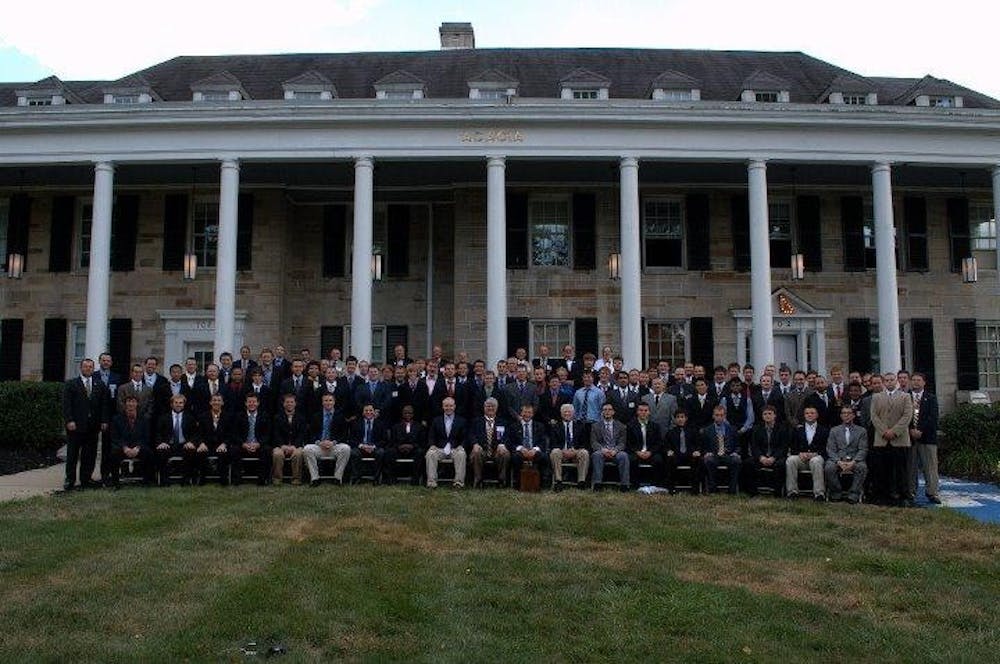The beginning and the end of an era were marked in early May.
Acacia was founded on May 12, 1904, at the University of Michigan with the principles of virtue, wisdom and truth foremost on the founders’ minds.
Sixteen years later, the fraternity was expanded to IU.
The organization received its charter May 22, 1920, and members became brothers.
Brothers became Acacians.
But this spring marked a turn in the fraternity’s development.
IU and Acacia International have announced that Indiana Acacia fraternity’s charter has be revoked.
The possibility of issuing another IU charter will be reconsidered after two years, and only after current brothers have time to graduate.
Reasons for removing the charter, which is a document issued by the international fraternity that validates the local organization, included allegations of hazing and drug dealing.
But IU Assistant Dean of Students Stevan Veldkamp said the main reason Acacia, as well as other fraternities and sororities, are often kicked off campus is that their actions do not align with the values the group was based on.
“Fraternities and sororities are values-based organizations that are expected to uphold their espoused values as well as those of the University,” Veldkamp said in an email.
“When an organization does not act in accordance with those values and the environment does not foster a culture of care, then it should no longer be allowed the privilege of serving as a Greek organization on campus.”
The mission of Acacia’s fraternity is long: Brothers are expected to pursue community service, character development, achieve academically and lead and attract prospective
members.
The fraternity slogan promises, “Preparing Tomorrow’s Leaders Since 1904.”
But President of the Fraternity Building Corporation Matt Cairns said it was recent members who compromised these original values.
“A lot of it boils down to how a chapter is organized, and it became evident that there was not a lot of accountability within the chapter,” Cairns said.
Internal organization of Indiana Acacia was governed mainly by a House Council, or a group of five elected members within the house.
Traditionally, these members oversaw house operations, organized brotherhood events and headed pledge education.
Cairns iterated that, although not every member was responsible for hazing, drug dealing or drug use, it was clear there was oversight regarding the individual members’ actions.
“I’m sure they were having a lot of fun,” he said. “But in terms of leadership, safe living and creating a learning environment, those are the things they should have been
focused on.”
Problems were described as serious and systematic on the Acacia alumni website.
In spring 2012, the University put Acacia on social probation.
Suspicious activities had been continually reported.
Acacia was not allowed to pair with Delta Delta Delta for Little 500 and was barred from participation in all greek-sponsored events.
A fine of up to $500 was issued to the house.
“Despite our best efforts, and despite being given ample opportunity, the chapter showed no signs of being willing to change their ways and right the sinking ship,” Cairns explained to Acacia alumni in an email.
The fraternity’s charter was pulled.
Now, about 150 Acacians are being screened for their role in these events. Individuals will either be asked to resume alumni status or will be de-activated from the fraternity.
The white, columned house on the corner of Third Street and Fess Avenue will be leased to another organization on campus.
“And Phi (Kappa) Psi shall be joining the 3rd Street Elite while they remodel on nojo #RIPAcacia,”read a June 19 tweet from Greek Gossip, an Indiana Twitter account with more than 950 followers.
Assistant Executive Director of Acacia International Keith Bushey said the Indiana charter will be renewed in two years, perhaps in May.
“Sometimes you don’t know what you’ve got until it’s gone,” Bushey said. “These are college kids who need to learn that they are not invincible.”
Alleged hazing factored into loss of Acacia's house, charter

Get stories like this in your inbox
Subscribe





